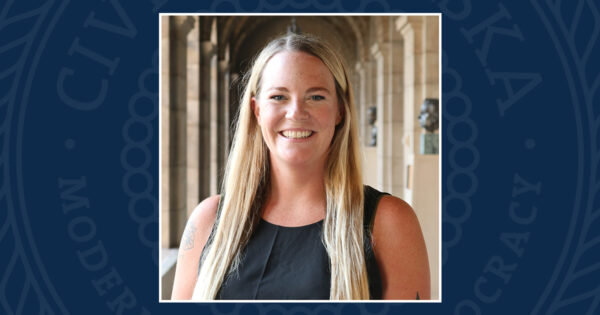For the remainder of the academic semester, Civic Nebraska will be sharing guest blog posts from undergraduate fellows participating in our Rural Civic Action Program, a joint program with UNL’s Agricultural Leadership, Education and Communication Department, and UNK’s Chancellor’s Leadership Course. The program is made possible through grant funding from the Rural Futures Institute. Through meaningful community-based service learning projects, students and undergraduates practice critical thinking, civil discourse, leadership skills, and promote youth capacity to positively impact their community. We’re excited to share student perspectives on this process!
By Ali Creeger
At the end of August, I started a class at UNL that was different than any other that I’ve taken on campus. In this course I am called a “fellow” and work on campus on learning how to be a facilitator. Instead of just a regular classroom setting where the professor lectures, we blindly memorize facts, and take tests, this class allows me to take the knowledge we learn and apply it in a real situation where I go to a rural high school to work directly with students. I also chose to take this class because I am majoring in environmental studies with a minor in leadership, and think this will be a perfect way to help me gain skills that I will use in my field. In the future I want to work with people and be able to properly communicate environmental problems and hopefully be able to initiate change in communities. I knew that working with a group of high school students may be difficult at times, but in the end very rewarding and ultimately take a lot away from it.

I chose to go to Weeping Water High School and work with a small, health class of ninth graders. For my first visit, four weeks into the semester, I was nervous about teaching the class. The days leading up the visit I was practicing what I would say and making sure I knew my schedule so I would stay on task. But, afterwards I realized there was nothing to worry about. They were a great group of eight students, led by their health teacher Mrs. Roehl. I then looked forward to seeing them every time I went to their school. As the weeks went by, we worked through the process of service learning, what it was, why you should engage in civic activities, as well as picking a project for the students to conduct.
What was so great about the process was that the students are completing their project on their own, I am simply asking the right questions and leading them.

But, by the third visit, I entered the classroom with hesitation and uncertainty. That class I had 48 minutes to help the students pick a final project, and I had to clue what was going to happen or what I would say. I am very detailed oriented and I like to plan out my schedule, even with key phrases I want to say. So, by not know how the students would react or what they wanted to do was terrifying. We ended our last visit with two main ideas for a project, helping with the Special Olympics and teaching younger students about physical fitness. I immediately started the class, afraid to lose any time at all. The first thing I wanted the students to do was make a pros and cons list about the two topics, but that didn’t even happen. We had to discuss logistics of what the two projects would entail, and with each new discussion point, it forced something to not work with one of the two projects. I had no clue how to proceed when finally one student offered a completely new idea. While I didn’t want to completely give up and abandon our last ideas that we spend quite a bit of time discussing, I had to hear him out. His new idea was to volunteer at a homeless shelter, which initially seemed like a ploy to get out of school for a day (and probably was), turned out to be an idea that would create a great project.
I started that class with hesitation and uncertainty, and 48 minutes later I left with a huge sense of accomplishment and pride in my group of ninth graders. As a team, they were able to collectively solve an issue that none of us could do on our own, including myself. From the initial idea of visiting a shelter, they expanded their project to be so much more. They would take the information they learned from a service trip to People’s City Mission in Lincoln to put their own coat drive together around Weeping Water, while also raising awareness. Even th ough this project is still in the works, I know I have personally learned so much already. This really ensures that this project and class is one of a kind. Every fellow’s experience is unique and rewarding in a different aspect, but I know that I am getting more out of the project than I ever imagined.





